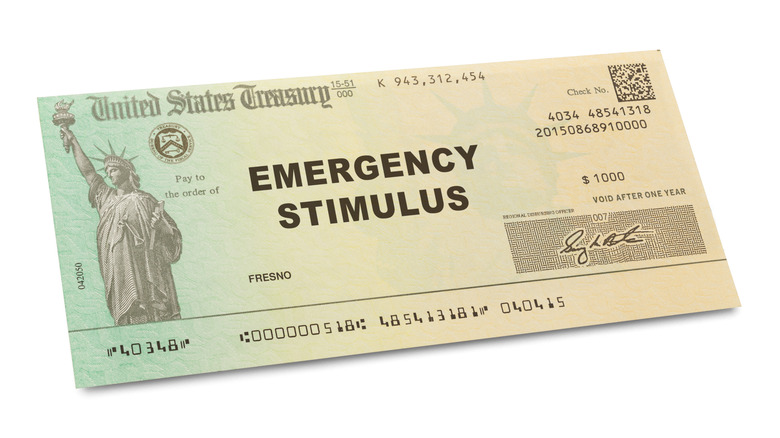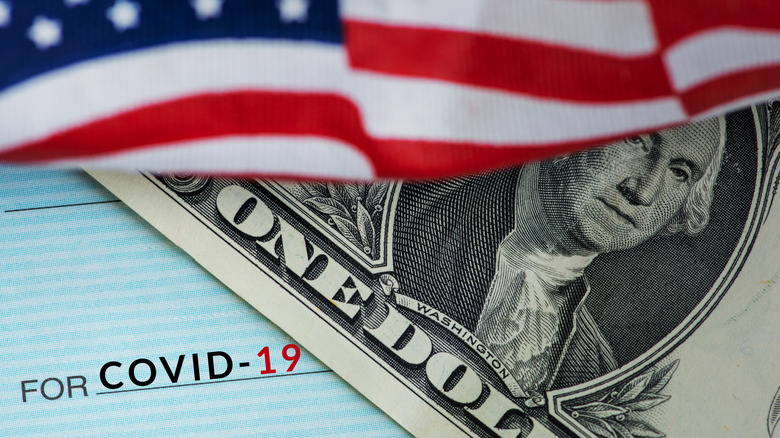Fact Check: Are More Stimulus Checks Actually Approved For All States?
Who couldn't use a surprise $1,400 windfall? While that amount won't do much to help you retire in America's wealthiest suburb or even travel to one of Italy's most expensive tourist cities, $1,400 sure could go a long way right now. The dream of being granted surprise cash to spend on fun experiences, invest in your holiday shopping budget, or to chip away at monthly bills is a powerful one. Twisting this desire with fact and fiction is also how rumors get started, like the one that another $1,400 stimulus check is coming for Americans in 2024.
You may have seen viral videos or websites promising $1,400 stimulus checks are coming to qualifying Americans in March 2024. Perhaps you immediately dismissed these pieces of media as what they are: sketchy-looking scam edits of old President Biden speeches with updated check issue dates superimposed on the video. Or, maybe this promise of stimulus check funds came to you from a more trusted source than the internet.
More stimulus checks are not approved for all states, but a friend or family member could have taken the sites and videos as legitimate, then told you the semi-trustworthy phrase: "I heard it on the news..." Read on to learn the deal with the rumored $1,400 stimulus checks, why these rumors might have started, and how you can avoid falling victim to believing and spreading misinformation in the future — whether it reaches you in the form of a TikTok clip or your Uncle Petey.
The roots of the rumor
The rumor of the "new" stimulus check has its roots in very real stimulus checks of the past. During the lockdown era of the COVID-19 pandemic, a series of three Economic Impact Payments, or stimulus checks, were issued to qualified individuals through the IRS, under the Coronavirus Aid, Relief, and Economic Security (CARES) Act for round one in March 2020, the Consolidated Appropriations Act for round two in December 2020, and the American Rescue Plan Act for round three.
While these stimulus payments varied in amount, a key number used by today's rumor mill comes from that third round of stimulus checks. Per a statement from the Department of the Treasury, that third round of payments "provided Economic Impact Payments of up to $1,400 for eligible individuals or $2,800 for married couples filing jointly, plus $1,400 for each qualifying dependent, including adult dependents."
While that number isn't anything to sneeze at, there are some key numbers missing from this statement that might have contributed to today's trouble: the date. Many official government webpages, including the Treasury statement, do not bear an official date of publication, or at least lack a consistent inclusion of publication dates. A missing date, coupled with information on stimulus checks written in the present tense, can be confusing. Someone could honestly misinterpret this information in the spirit of financial hopefulness. Or, someone could spread a rumor of "free money" with malicious intent.
Don't miss misinformation
Weekly news magazine, Newsweek, has traced the current round of stimulus check rumors to a viral TikTok video posted to the social media video platform on March, 7, 2024. The video features a Biden campaign speech mentioning $2,000 stimulus checks, with a side-by-side video of a hand pulling a check from a mailbox. The video also has several phrases superimposed, including "President Biden says $1400 check coming March 14," "On this Day 3/7/21" and "Stimulus checks coming soon."
While visually confusing and not official or accurate, many still take clips like this as such. Maybe that's due to the heat people feel during today's economic uncertainty. The addition of divisive politics and financial hardship throws fuel on the misinformation fire. Comments on the TikTok video run the range, overwhelmingly with people claiming their political affiliation, their desire for a check and confusion as to why it hasn't yet arrived, or people simply calling out that the video is dated for 2021.
Misinformation feeds many of the money scams to watch out for in 2024. While the growing prevalence of AI will increasingly make misinformation a problem, use common sense and a little mental elbow grease whenever you come across something too good (or bad) to be true, especially before sharing that information. When you see a post that spikes your excitement, remember to at least consider the source, consider the date, and consider the clickbait potential behind it before considering the information as truth.


